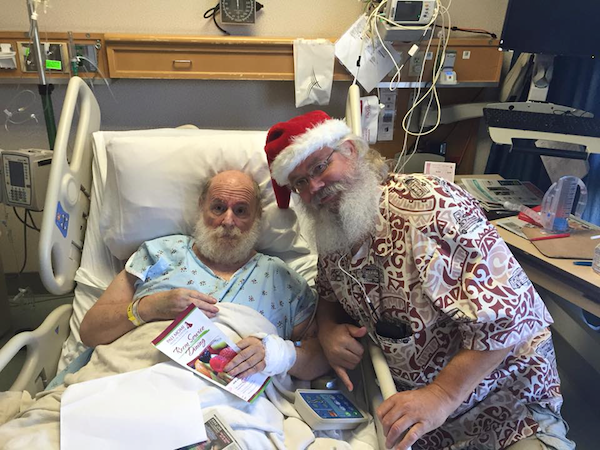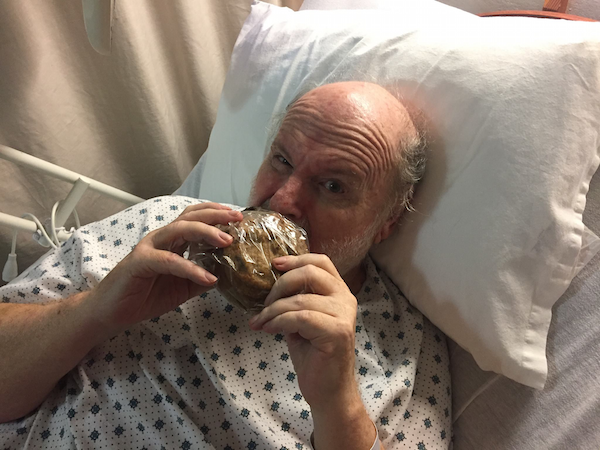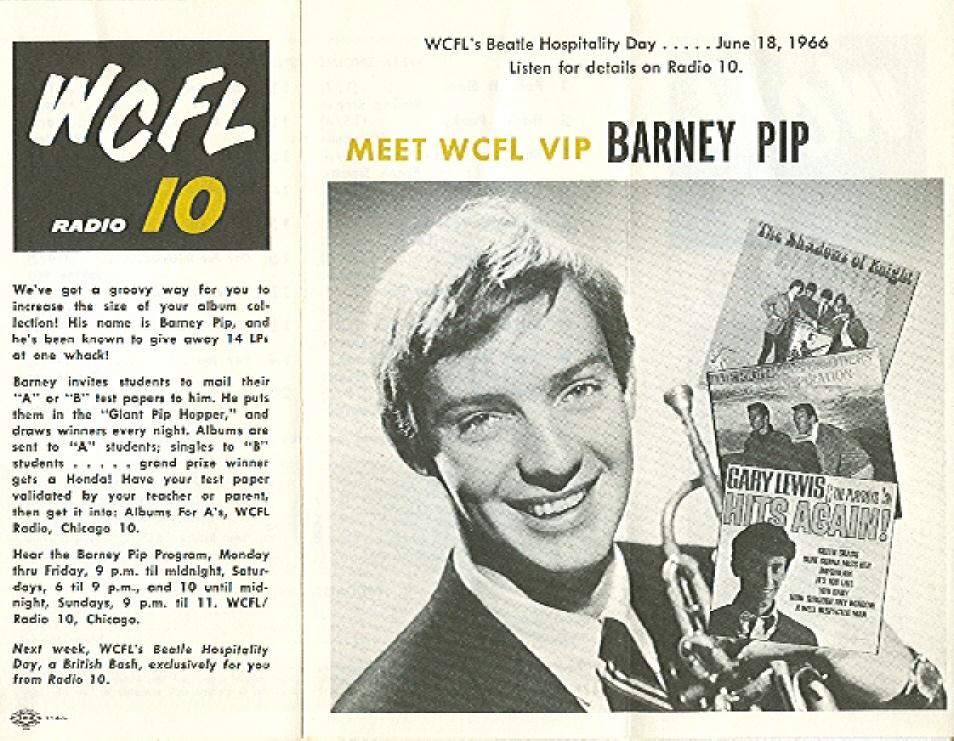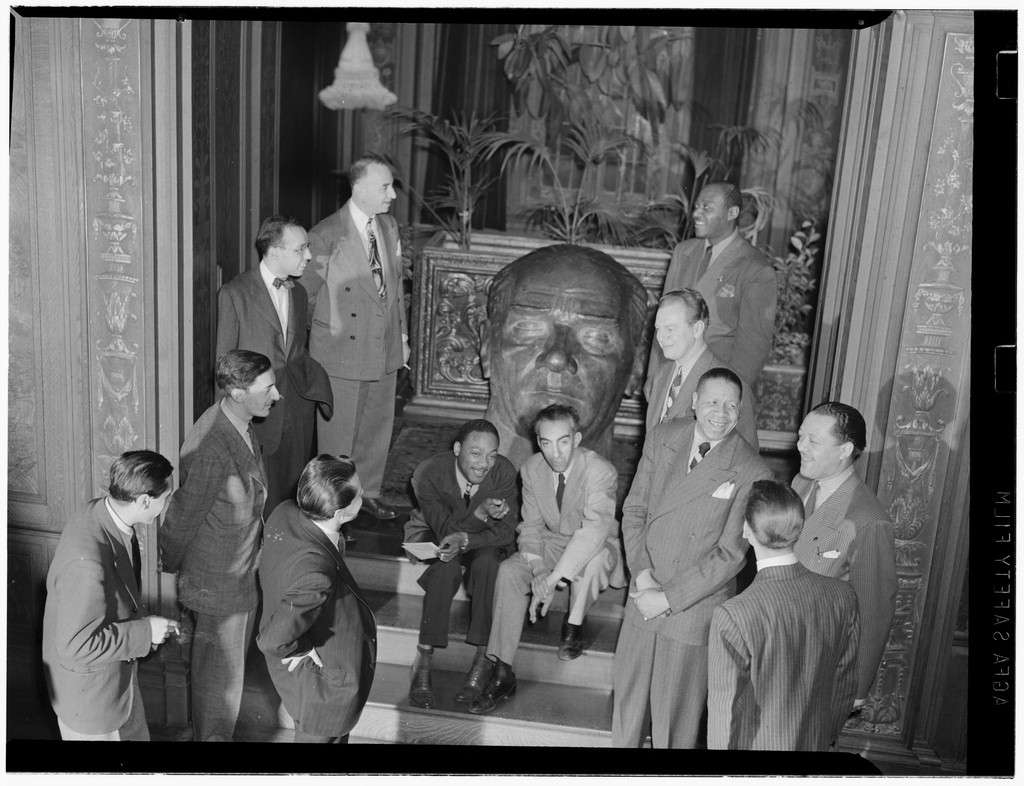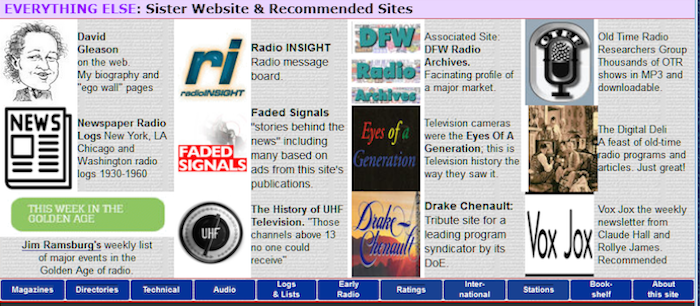


1.4.16
By Claude Hall
And Rollye James
Claude: “I was deeply grateful when Bill Randle put in a good word for me at a small
university in Oklahoma. He was going there to teach communication and there was a job
open for a public relations director. He insisted that we could turn the university into a
powerhouse and, meanwhile, I could earn a master’s degree. ‘Just don’t tell anyone. A
college is like a bowl of jelly. You push here and it wriggles over there’.
“I didn’t realize until much later that being around Bill Randle for a few minutes – let alone
slightly more than two years – is like stepping into the middle of a tornado. But I’ve written
about that elsewhere and elsewhen. The pay at the university wasn’t very good, but I was
earning some freelance money, courtesy of Jonathan Fricke, and, anyway, I’d always wanted
a master’s degree. So, Barbara and I loaded up the proverbial U-haul and we left for Enid,
OK, the armpit of the universe. I would have preferred to stay in the San Diego area. Barbara
and I both loved the West Coast. Who doesn’t? But I’d failed to save Casino Magazine, a
new (circa 1980) consumer magazine launched by magazine legend George von Rosen
(Modern Man, Guns, etc.), a man who controlled every penny; he even locked up the Xerox
machine at 3 p.m. every day. I’d given the job a good shot. I’d always wanted to be editor of
a monthly magazine. My assistant was Charlie Hennegan, a good man, and my art director
was Magie Loos, a good art director. That was the staff. To conserve expenses, I wrote some
of the material myself. Including the article with Joe Smith, a Boston radio personality who
became one of the most important people in the music business. The problem was that the
circulation manager for all of the von Rosen magazines couldn't get Casino on the stands and,
subsequently, was hiding the returns. We thought we were selling, but we weren’t. When von
Rosen found out, he decided to fold the magazine. I was out of work. Funny note: A year or
so later while in Oklahoma, I received a phone call from the ‘former’ advertising director of
Casino, who’d gone under the name Jon Hemp. A nice guy and an ex-GI. He wanted to
know some information about recording studios and I told him. I asked what he was doing
these days. He was working either for the secret service or some similar operation. ‘How
long have you been doing this?’ ‘Several years’, he said.”
“Millionaire: King of Flash and Dash”
By Dan Banks
He’s a millionaire superstar in a world of millionaire superstars ranging from Linda Ronstadt
to Dean Martin and Frank Sinatra, from Kareem Abdul-Jabbar to the ghost of the late
Jim Morrison of the Doors, from corporate dealings with lawyers to the heady music of the
Eagles alive and live in a stadium with 30,000 screaming fans … and his business and
personal life races from the Roxy in Los Angeles to Caesar’s Palace in Las Vegas, from
London to New York to Sydney and Tokyo and back home to his mansion in Beverly Hills or
his beach home at Malibu on the Pacific Ocean.
He’s a record man. His name is, of all things, something as plain as Joe Smith. And while he
sometimes wisecracks – and inside the industry is called upon to emcee every industry
convention, every benefit dinner, every tribute gala, every association function – he’s also a
tough-as-nails business executive.
He deals with Linda Ronstadt, the Eagles and others and has had to deal with Frank
Sinatra, Dean Martin, Sammy Davis Jr., Mitch Miller, Bill Cosby, Petula Clark, and still
deals with many of the greatest music stars in the business. It’s not an employee-boss
relationship, it’s a much more delicate situation because these artists represent untold millions
of dollars of business and industry and public power.
And the artists and their managers are their record producers usually become personal friends.
The entire spectrum of relationship between artists and record company chief – Joe is
chairman of the board of Elektra Records – is unusual and unique.
“Basically, artists are generally very young and not terribly sophisticated about how to handle
success and money and they surround themselves not all of the time with people who give
good advice but are usually contemporaries just as unsophisticated. Perspectives get warped
sometimes; they think they’re divine because they’ve had some hits and can attract 60,000
people out to a stadium. And then they get difficult.”
About Linda Ronstadt, however, he considers her a “super-professional.”
“She is as close a friend as I have on the artist roster. I’ve known her a long time and through
different situations – back when she was with the Stone Poneys and on Capitol Records
struggling along and through ups and downs of her life personally. I was thrilled to see her go
to Broadway with ‘Pirates of Penzance’. And now she’s planning an album with producer
Jerry Wexler of old blues songs. I think that’s remarkable; she’s always strived to stretch out
her career. She’s a truly unusual, bright, eager young woman who has extraordinary talent.
And I’m so fond of her.
“She’s still the queen of pop music. No question. And I think the best voice – absolutely the
best voice.”
Over the years, he has dealt with fascinating people like Van Morrison, the Grateful Dead,
Jimi Hendrix, and volatile and extraordinarily bright groups and people like the Eagles,
Queen, Jackson Browne. “All very opinionated about what should be for their careers. I’ve
had to work in that context, and nobody’s easy. But then no one said life itself was fair or
easy.”
Those artists – the lucky ones, because all record companies turn down hundreds upon
hundreds of aspiring superstars each year – enter a rather interesting building on La Cienega
Boulevard at the north end of Los Angeles’ fabled Restaurant Row. Once they get past a wall
of wooden bars, the artist would go up a winding staircase accented with sunlight beating at
green plants. It’s a scene of serenity and prosperity.
Up at the top of the stairs is the office of Joe Smith and once it flocked with a flurry of
excitement that was hectic, never-ending, and sometimes absolutely crazy. Today, however,
the office at the top of the stairs is somewhat quieter; it’s still busy, but more businesslike.
The ‘flash and dash” of the record industry disappeared more than a year ago in a combination
of the energy crunch (records are made from vinyl, thus oil-based) and inflation. At one time,
Elton John was selling millions of albums and grossing money so fast it was difficult to count
it. Just for the hell of it, and to introduce his next million-seller, MCA Records threw a party
that reportedly cost $30,000 for 2,000 industry and press people on a western street at
Universal Studios. A covered wagon of ice and Coors Beer was at the beginning of the street.
The first “saloon” offered Korbel Champagne. And each establishment along the street had
another goodie or two for your pleasure – tacos, for instance, in one place, barbeque in
another. Everything free.
At the end of the street Elton John performed tunes from his new album on the platform of
the “train station.” And his backup singers included such as Dusty Springfield.
Another time, he rented an entire carnival, rides, clowns and hotdogs, for a similar party.
The entire record industry was like that. You didn’t buy a plane ticket to go somewhere, you
leased the entire plane for the month and new industries sprang up that rebuilt 707’s into
airborne palaces strictly for recording artists. One that still may be somewhere in the air
above your head has not only a sauna but also a recording studio in its carpeted plushness.
(TO BE CONTINUED)
To have Vox Jox sent to you directly each Monday,
OTHER MATTERS
Woody Roberts, Texas: “Claude, I used the period between the Winter Solstice and the
arbitrary New Year to load your first draft of ‘George’ into my Kindle app. Wow. A wonderful
read. Perfect for this moment of the year when many of us are extra aware of time passing. It
hearkened me back to my radio years with names and incidents of people some of whom I
never met but most of whom I recognized through VOX JOX and your conferences. By
weaving George in and out of your life’s fascinating trail of pop music industry places and
people I'm getting to know George the man I never knew or was even aware of from a
programming standpoint. Weird but true. I can’t understand how I missed checking out
George with his important rating victories.
“I do remember seeing Bill Drake catch the golden ring to change the world of Top 40 in
1965. Never knew how much of that initial KHJ format was Drake and how much Jacobs.
Both were brilliant programmers. I often wondered about Drake after the sale of D/C but
didn’t learn until you and I started communicating that Drake was dead. I had only two
meetings with him but walked out of each impressed by the depth of his knowledge and
carrying something to think about. And there was Buzz. A lot of people don’t remember that
Buzzy once worked for Drake in San Diego. I only spotted one error and it is at the start but
is not repeated in the manuscript. You have Bill working for McLendon and then for Todd
Storz when it was the other way around. At the first Top 40 station ever, Grahame Richards
was the PD and mid-morning DJ and Bill was the national PD for Storz. I don’t know why he
left Storz but Gordon hired him as national PD to launch his chain of Top 40 stations and
eventually Grahame became the national PD for Storz. Don’t know the whole story but Bud
Connell is somewhere in the early Omaha mix. And don’t know why Bill and Gordon parted
ways but the national PD who launched Top 40 on KILT in Houston 1956 was Don Keyes.
‘Claude, thank you for the privilege of seeing what you look like in a first draft, usually I only
see your finished and polished works. ‘George’ was great look back and the matrimonial era
of radio and records -- who have since divorced … or at least, separated.
More Woody: “Some outrageous events I participated in as DJ, all but the GTBR were to
benefit nonprofits: Demolition Derby; Swimming with Porpoises; Guinness Wold Record for
Outdoor Empty Beer Can Stacking; Parachute Jump; Half-Mile Horseback Race; Dribbling a
Basketball from San Antonio to Austin; Great Texas Bike Race departing The Alamo for our
State Capitol on to Dallas and finishing in Houston.
“That crazy event closed out my career as a radio broadcaster and it was indeed a fitting end.
Idea came from my friend Bill Young then PD at KILT. I was the only person at KTSA in
physical condition to do it as I was already a bicyclist. Though I was an off-the-air VP GM
my name was known in the community from my DJ years at KTSA and KONO and the past
four years from my hard-hitting local editorials on 550 AM. Though still at my desk I had
already resigned KTSA-KTFM and my PD Sonny Melendrez gave us a super sendoff in front
of the Alamo. Can't recall the KILT DJ’s name, but he was a fill-in part-timer and only 24
years old. KILT had a ringer in Scotty Thomas perhaps 28 who already had a thing for bicycle
racing. In a flat pancake city Scott would practice after getting off at midnight by racing up
and down parking garage ramps. I was 31 and mentally getting ready to hitchhike across the
USA. But first, I had a race to peddle. Gads. Forty-three years later I still find that last leg
of the race painful to recall....
“But, true fact is, we had the greatest of fun making once-in-a-lifetime memories on a five
hundred mile long magical mystery tour with its police escort and folks cheering us along the
way. It's a tale in and of itself; drugs, sex, great food, a stream of beautiful Texas landscapes
and good healthy exercise. This recalling of the past ... why, 'tis perhaps an end o' year cold
day with a glass of Merlot kinda thang.”
Claude: “Been an interesting week. You’re right about the timeline of Bill Stewart. I’ll fix.
Mucho gracias!”
Jim Slone: “My friend Jim Phillips has died ... I feel a great sadness ... Never met anyone
quite like him. Positive, up lifting, wise, kind, positive and filled with hope. He let me put
my FM tower on the mountain with his when I bought my two radio stations in El Paso-1978.
I never heard anyone say an unkind word about Jim and I never heard him say an unkind word
about anyone. He was a Christian so he is in Heaven today.”
Claude: “The El Paso Times obit stated that Jim Phillips, a native of Dallas, died Monday.
He was 83. He came to El Paso in 1969 as chairman and CEO of KHEY. He also worked for
Wells Fargo Bank on the board. He was deeply involved in civic activities. Funeral will be
Thursday at Trinity First Methodist. He will be buried in Boerne, TX. He is survived by wife
Nita and son J.R.”
“Also leaving us was Natalie Cole. I never appreciated her material, but like many people in
this world doted on her father whose songs will live in my heart forever. May the Good Lord
bless and keep you, girl. May the Good Lord look with favor on us all.”
Rollye: “Well at least Ron Jacobs is still alive. For a minute there I worried, when I saw a
picture of him in the hospital on Christmas Day, but then I realized Ron likes to celebrate in
style. This room is more expensive than a suite at the Royal Hawaiian:
Rollye: “I have to ‘fess up. I didn’t find that shot on my own. I was talking with John Rook
(encouraging him to write about some of his earlier antics— like how he found out that
Liberty’s Al Bennett cosigned the loan for his house) and he mentioned it. I immediately
went to Facebook and found the following shot with the caption “Vox Jox”. Had to print it.”
Rollye: “Evidence of the quality of hospital food? Leave it to Ron to order in:
Rollye: “There are several more on Ron’s Facebook page here, along with a number of
goodies you’ll probably like. I’d say ‘Here’s to happier times for Ron in 2016’ but he looks
like he’s havin’ a good time already. Get well, Ron!
Cary Pall: “Ran across some airchecks of Barney Pip on WCFL (on You Tube). It was a real
joy to hear him again. I was a huge WCFL fan, and especially Barney, who was the first DJ I
ever actually spoke to. He always said hello to listeners on-air, admonishing them to "Turn
Into Peanut Butter"! He played the trumpet on air, horribly! He sounded about as different
from the rest of Chicago radio as anyone could...and made a point of it by making fun of spots
done by big voice guys like Joel Sebastian. I always thought he should be on in Nashville or
Dallas (eventually he did work in Ft. Worth for John Rook at KXOL). My dad would allow
me to make one long-distance call per week to Chicago to talk to Barney. As a 13 year old kid,
when I told him about how I wanted to be a DJ, he told me the famous fable about putting "ten
marbles in your mouth...take one out every day...when you lose all your marbles, you're a DJ!"
I may still have my Pip Underground membership card somewhere in my files of radio stuff.
I found out in researching his career that he had his ups and downs with bipolar disorder,
which might explain why some of the airchecks I heard were missing the joy of others. I also
found out that he worked for a stretch at WPIX-FM New York in 1973. I started across town at
99X in '75. I would have loved to meet him. He truly was one of the nice guys in radio. Hope
2016 is great to all of you…”
Rollye: “Sentiments returned. I hope 2016 is the year that quickly brings you a kidney without
complications, Cary— and only the best surprises. I knew Barney Pip over the years, but we
really became friendly when I was writing Vox Jox for Billboard. When he timidly identified
himself on the phone, I responded with “Gonna turn me into peanut butter?” He seemed so
grateful that he was remembered and welcomed, and I was more than happy to give him
whatever ink he wanted. We stayed in close touch after that, and I remember the last letter I
got from him shortly before he died. He was finally happy, and amazingly— married!
Everything was looking up. The car accident that took his life was beyond horrific. I didn’t
have the details at the time, but when I heard he was gone I was so depressed. He lived a
tortured life emotionally and he was finally in such a peaceful place— and then he dies? Not
my place to question the wisdom of the Lord but I couldn’t help but utter a few choice words
as I wondered “Why, now?” I’m sure he went to an even better place, but it would have been
good for all of us if he could have stuck around a while longer. As Claude says, We come.
We do. We go. I just wish Barney Pip had more happy times doing it.”
David Gleason: “Long time. I have been scanning away and you have a radio station! I just
wanted to let you know that I put a link (I do very few and only for things I care about) on the
site home page at www.americanradiohistory.com for your new weekly endeavor. Since I was
in places like Puerto Rico and Ecuador from the 60’s to the 90’s, I was a spectator rather than
a participant to the great radio that went on in the US. I might even have made a trip or a
hundred to find things I could brazenly steal, translate to Spanish and then use to impress my
listeners back home. But one thing was a constant, and that was getting Billboard and reading
Vox Jox. So my little link on the site (which has a couple of thousand Billboard issues
available for reading) is a way to thank both of you who kept me up to date on what radio was
doing in all those years as an expat trying to bring good radio to wherever I was marooned at
the time.”
Rollye: “Thanks David! I am appreciative and honored. AmericanRadioHistory.com is the
perfect example of the internet at its best and I’d be lost without it. I sent you a reply when I
got your email. Check your spam folder.”
More Rollye: “Claude sent me a great picture of a bunch of record moguls at the Beverly Hills
Hotel pool. Classic shot, and rights restricted. (I could have bought it for $175, but as much
as I love you guys, I decided I’d search for something in the public domain.) Taking the
Waaay Back Machine, I came up with this in 1940. It’s bound to make most of us feel
young— and impressed by the amount of talent gathered together:
Nesuhi Ertegun, Herb Abramson, Ahmet Ertegun, Mezz Mezzrow, Jay Higginbotham, Art Hodes,
Lou McGarity, Henry Allen, Lester Young, and Sadi Coylin, Turkish Embassy in D.C. 1940
Bob Sherwood: “Claude (and Rockin’ Rollye): This doesn’t help your current unfortunate
and unacceptable difficulty but it’s a small suggestion for the future…..find a local pharmacist
and transfer your business there. It’s nice to support local businesses and of equal or greater
importance the local pharmacists tend to understand individual problems, the realities of
everyday life and react sympathetically. I’ve had occasions when there were timing issues
sometimes caused by inefficient Doctor’s staff members renewing prescriptions or mistakes
on our part and the local pharmacy would provide one or two days needed medication while
all was being sorted out. Not a prayer that would happen at Walgreen’s or CVS. Hope you’re
feeling better and a Happy New Year to you, Barbara, Rollye and all of those near and dear to
each of you. The Lovely & Talented Bob Sherwood”
Rollye: I concur on all points, Bob. We don't have things like Walgreens or CVS here, and
the first time I went to my local Palace Pharmacy, I dreaded hearing the price. Turns out
they're part of the Health-Mart group as are many small town drug stores, and they were
significantly less expensive than any of the big name chains. So it's a win all the way around.
Ken Dowe: “You're doing great, Rollye. We all appreciate your hard work and the helping
hand you're giving Claude. Maybe we will elevate you to Saint Rollye. Well done, and
HAPPY NEW YEAR! And, don't stay up all night anymore. The Report will get here when it
gets here.”
Rollye: “Wow, what a nice compliment, Ken! Thank you. Sainthood remains elusive, but I’m
happy to help any way I can. And it’s truly a privilege having you read whatever it is I think
I’ve got to say. As for staying up all night— that’s not the problem. It’s the getting to bed
early part that I’ve never been able to master. We try to turn the lights out around 4, but
usually it’s later. And proving that Jon and I live like two nine-year-olds whose parents are on
vacation, we just finished a midnight dinner of pizza, potato chips, Reese’s peanut butter cups,
and Mexican Coke. Thank God for radio. If we had to attempt a nine-to-five life, the results
would be impressive— in all the wrong ways. Suffice it to say that putting this column to bed
is not the last thing on tonight’s agenda for either of us. Happy New Year to you, too. And to
everyone reading this. I hope 2016 turns out to be the one we’ve all been waiting’ for!
